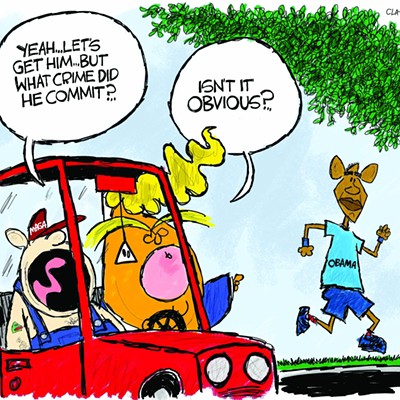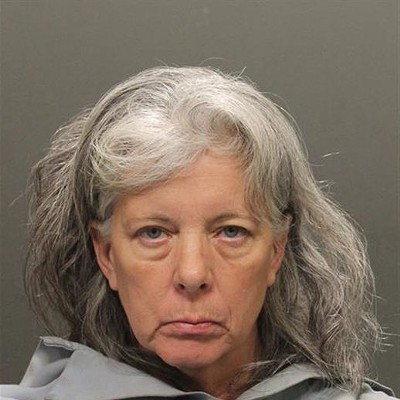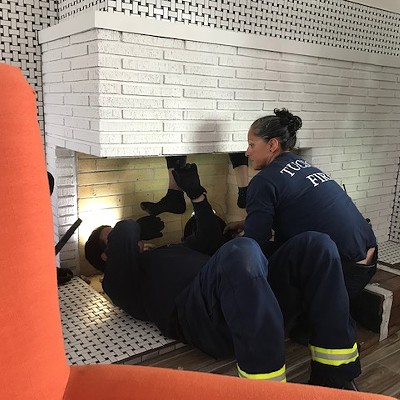The bus takes the same path that the slow-moving ambulance took when transporting Johnson to Kino Community Hospital--the ambulance in which Johnson died, a minute-and-a-half before reaching the ER.
Covaughn, a budding athlete who is completing eighth grade, attended the closing arguments in U.S. District Court in Tucson. He listened as Daryl Audilett, doing his job as a contract lawyer defending the police and fire department paramedics, trashed his uncle.
Tyrone Johnson was the victim of his own choices, Audilett said. Attacking sentiment for Ashley Johnson, Tyrone's daughter, Audilett said those choices included doing drugs instead of spending time with his daughter before he died.
Covaughn heard enough. During a break, he walked up to Stanton Bloom--the Johnson family lawyer who spent four weeks fending off attacks from the three defense lawyers--and said that what Audilett told the jury was not true.
"My uncle," Covaughn recounted later, "was going to meet us that day at Golf N' Stuff. Ashley was there. We were waiting for him. We knew something was wrong, that something happened. But he was going to be with her."
Jurors did not hear that part.
And on Tuesday, May 4, after stalling out for the third and final time, jury foreman Joe Azzarello sent a note telling Judge John M. Roll that jurors could not "in good conscience compromise" to reach a consensus.
Bloom pushed Audilett and Brenden Griffin, a lawyer for Southwest Ambulance, to agree to allow eight of the 10 jurors to reach a required unanimous decision. Roll told Audilett and Griffin not to "dismiss the offer out of hand." After a short recess to huddle and confer with their clients, Audilett rejected Bloom's proposal.
The jurors were called in. Roll asked them if they agreed with Azzarello's assessment. They did. At that point, Roll declared a mistrial.
Juror first bogged down after more than five hours of deliberation on Friday. Roll told them to return over the weekend to give it another shot. He said the same on Monday afternoon, after Azzarello sent a note stating that jurors again were "hopelessly deadlocked."
Bloom said the case will be re-tried.
The questions before the jury were whether police used excessive force and violated Johnson's Fourth Amendment rights against unlawful search and seizure; whether Tucson Fire Department paramedics and EMTs failed to provide care at the community standard by not giving Johnson oxygen and not calling for an advanced support ambulance; and whether Southwest Ambulance EMTs provided care below the community standard by not giving oxygen to Johnson and not transporting him under Code 3, with lights and sirens and the capacity to travel 60 mph--15 mph above the speed limit along Golf Links Road.
After nearly four weeks full of testimony, including statements from dueling medical experts, jurors were instructed to parcel out in verdict forms the percentage of culpability that lay with police officers Eric Murch and Floyd Ginn; Tucson Fire Capt. Tim Cornely; Tucson paramedic Molly Uberuaga; Tucson EMTs Greg Napier and Frank Profita; and Southwest EMTs Amanda Kitchen and Marcus Werner.
Under state law, all those percentages could be obviated by a finding by the jury that Johnson was 50 percent responsible for his own death.
It was a provision that Griffin--who, with Foster Robberson, defended the Southwest Ambulance EMTs--tried to hammer home to the jury.
"If he's at least 50 percent responsible, then you can hold him 100 percent responsible," Griffin told the jurors during his roughly 75-minute portion of the defense's closing argument. "The law gives you that power because it is the public policy of this state to give no benefit to the drug user."
That was enough to split the jurors, based on brief discussions outside the courtroom. According to jurors who spoke informally to spectators after the trial, as many as seven jurors put Tyrone's share at 50 percent or more.
In the final days of testimony, Dr. Cynthia Porterfield, the Pima County forensic pathologist who performed the autopsy on Johnson, appeared at times to side with defense lawyers by pointing to cocaine as the primary cause of death. Lawyers for the police and paramedics and for Southwest Ambulance repeatedly turned her to say that absent cocaine, Johnson would have survived.
But Bloom swiftly turned her back around.
"My testimony is that he died as a result of a combination of everything that happened," Porterfield said in response to Bloom's questions.
The cocaine--a small amount was found in Johnson's system--cut both ways. Police said they pursued Johnson because one cop said he found a crack pipe in the car Johnson was trying to gas up at a Circle K. (He had initially attracted the attention of an off-duty cop who, testimony revealed, was essentially obsessed with Johnson, and just happened to be hanging out at the same Circle K that day.)
Drug users, including those under arrest, are routinely treated by paramedics. And doubt was raised about how paramedics treated--or failed to treat--Johnson as a man under the influence.
There also was dueling testimony about positional asphyxia and the dangers of pepper spray to those with respiratory problems such as asthma.
Dr. Theodore Chan, a San Diego emergency physician and researcher who was a star witness for the defense, explained findings from his controversial studies on the effect of pepper spray and in-custody positions that can impair breathing. Pepper spray, he said, can actually increase a person's ability to move air. And his subjects in another test had no trouble breathing even with their hands cuffed behind their backs and while they were on their stomachs.
Bloom undercut Chan's testimony by simply noting that Chan studied people in a lab, not on the street or in the heat.
Much of the attention during closing arguments shifted to Johnson's daughter, Ashley, who turned 15 the day before. She took a seat next to her uncle, Timothy, and listened as Bloom read a moving letter she wrote to her father. Ashley became the primary plaintiff after Tyrone's father, Frank, died, and after the strategic removal --late in the trial--of Tyrone's mother as a plaintiff.
Griffin took note of Ashley's attendance and delivered a softer message than Audilett. Audilett wasted little time in trashing Johnson, portraying him as a chronic criminal with the help of police reports that gave no indication on how each incident was adjudicated.
Murch and Ginn had to chase, baton and pepper spray Johnson, Audilett said, because "what happens if he car-jacks somebody?"
Audilett didn't stop there.
He trotted out a quote from the 18th-century politician-philosopher Edmund Burke: "All that is necessary for the triumph of evil is for good men to do nothing."
Audilett, who displayed the quote on jury and courtroom screens, thus equated Johnson--a generally jovial and big-hearted young man in the throes of drug use, according to testimony--to the notorious and truly demented that Burke's quote has become popular in classifying: Osama bin Laden and Saddam Hussein.












